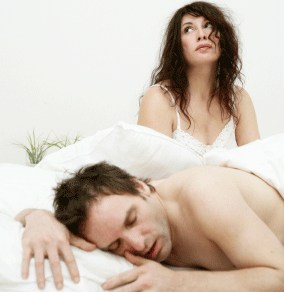Laser Surgery for Snoring
Click Here To Know The Symptoms, Causes & Effective Cures For Snoring
>> Get Your Treatment Now <<
Approximately 45 percent of the adult population in the world snores at least occasionally, while 25 percent are chronic snorers. Women and little children also snore at some point although this condition is most frequent in men and obese people and becomes worse with age. The vibratory sound, we call snoring, is produced when the free flow of air passing the air passage is obstructed and vibrates against the soft tissues on the nose and the throat area. Previously regarded as a mere nuisance, snoring has been recently associated with obstructive sleep apnea (OSA) and Upper Airway Resistance Syndrom (UARS), as well as illnesses like hypertension, high blood pressure, and cardiovascular diseases.
With the recent findings, snorers have become conscious of their condition and desperate in looking for cures to their snoring problems. In 1990, patients who became frustrated with the home remedies, orthodontic appliances, and Continuous Positive Airway Pressure (CPAP) to cure snoring agreed to undergo the Laser-Assisted Uvula Palatoplasty (LAUP).
LAUP uses laser surgery for snoring and mild OSA by vaporizing the uvula and a part of the soft palate in a series of non-invasive procedures. Patients undergoing laser surgery for snoring are treated with a local anesthesia in an outpatient operation. Once the anesthesia takes effect, the doctor administers a CO2 laser to make two vertical incisions in the soft palate on each side of the uvula shortening it to eliminate that, which causes the obstruction. It takes five clinic visits each spaced four to eight weeks apart for the laser surgery for snoring to complete.
How long is the recovery period?
Most patients are able to get back to their daily routines on the same day although the patients are warned of a sensation similar to that of a sever sore throat that lasts up to ten days after the laser surgery for snoring. This can be relieved by analgesics and anti-inflammatory medicines.
Patients who received LAUP treatment reported 90% improvement in lessening the incidence of snoring and sleap apnea episodes. However, the problem arises in the scarring of the soft tissues of the palate that resulted in more obstruction and worsened OSA after a year or two. Statistics noted that only a third of those treated with the laser surgery for snoring were deemed a success.
Should you get LAUP treatment?
If you've tried all possible remedies for snoring and have been unsuccessful, and if your snoring is disruptive to others around you including you, then you could be a candidate. Prior to undergoing laser surgery for snoring, your otoralaryngologist will examine you to evaluate what's causing you to snore.
Laser surgery for snoring is not widely practiced yet but doctors are considering this treatment if everything else, including the continuous positive airway pressure (CPAP), fails. Like any other surgical treatments for surgery, you just have to be ready for its consequences vis-?-vis your snoring.
Milos Pesic is an expert in the field of Snoring and runs a highly popular and comprehensive Snoring web site. For more articles and resources on Snoring related topics, Snoring Causes and Treaments, Natural Snoring Remedies and much more visit his site at:
=>http://snoring.need-to-know.net/
Labels: snoring_help, snoring_medication, snoring_product, snoring_sound, snoring_wav

